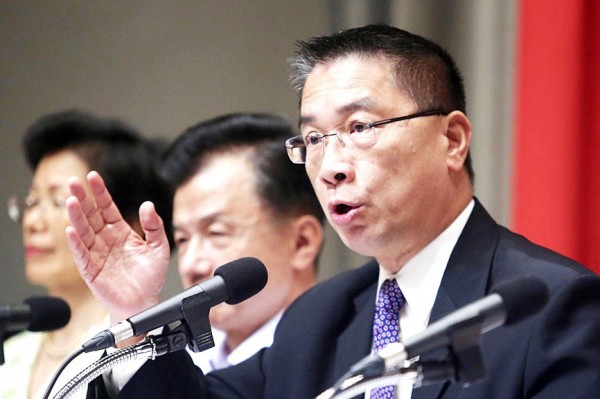《TAIPEI TIMES》 Cabinet strengthens China travel rules
‘SECURITY, SOVEREIGNTY’: Premier Lin Chuan said that the participation of state and military officials at Chinese events has affected public perception of the government
By Chen Wei-han / Staff reporter
The Cabinet yesterday approved stricter travel regulations for retired military and government officials to prevent sensitive personnel from engaging in political activities in China, with people found to have breached the rules to be deprived of pension rights or subject to a maximum fine of NT$5 million (US$163,393).
Retired officials visiting China and acting in ways that damage national sovereignty would face sanctions according to their rank and retirement status, according to draft amendments to the Classified National Security Information Protection Act (國家機密保護法) and the Act Governing Relations between the People of the Taiwan Area and the Mainland Area (台灣地區與大陸地區人民關係條例).
Former military generals, directors of intelligence agencies, and ministers and deputy ministers of agencies with access to sensitive security information who have been retired for fewer than 15 years would be deprived of 10 to 100
percent of their monthly pension for a five-year period, or would be subject to a fine of between NT$500,000 and NT$5 million if they had received a lump-sum pension payment.
Former lieutenant generals — defined as “low-intensity” regulated personnel — would be deprived of 10 to 50 percent of their monthly pension for five years, or be fined NT$200,000 to NT$1 million if found to have breached the regulations.
Those found to have breached the rules in an “overly serious” manner are to be deprived of pension rights for life, with their medals and awards to be rescinded.
The amendments were drafted following the attendance of 32 retired generals at a Chinese Communist Party event chaired by Chinese President Xi Jinping (習近平) in November last year.
“Due to the special nature of cross-strait relations, the participation of retired, high-ranking government and military officials at Chinese political events has drawn a lot of attention and greatly influenced national interest and public perception [of the government],” Premier Lin Chuan (林全) said.
The amendments were made to ensure national security and sovereignty, Lin said.
High-ranking officers are banned from traveling to China for one to three years after retirement, with agencies permitted to extend or shorten that range, but the draft amendments stipulate a minimum three-year prohibition, which can be extended, but not reduced.
Retired officials who had access to highly sensitive data might be placed under lifetime travel restrictions that require them to report trips to China to the government.
Military and government officials who worked in national defense, diplomacy, China affairs or national security units would be subject to the amendments, with an estimated 1,000 people affected.
They are banned from attending political activities, paying tribute to the flag or political symbols of China, or behaving in ways that damage Taiwan’s dignity.
However, they would be allowed to seek approval to attend non-political activities presided over by the Chinese president.
For example, former president Ma Ying-jeou (馬英九) and former vice president Wu Den-yih (吳敦義) would be allowed to visit China on tourism or cultural exchanges, but not for political purposes, Mainland Affairs Council Minister Katharine Chang (張小月) said.
新聞來源:TAIPEI TIMES















